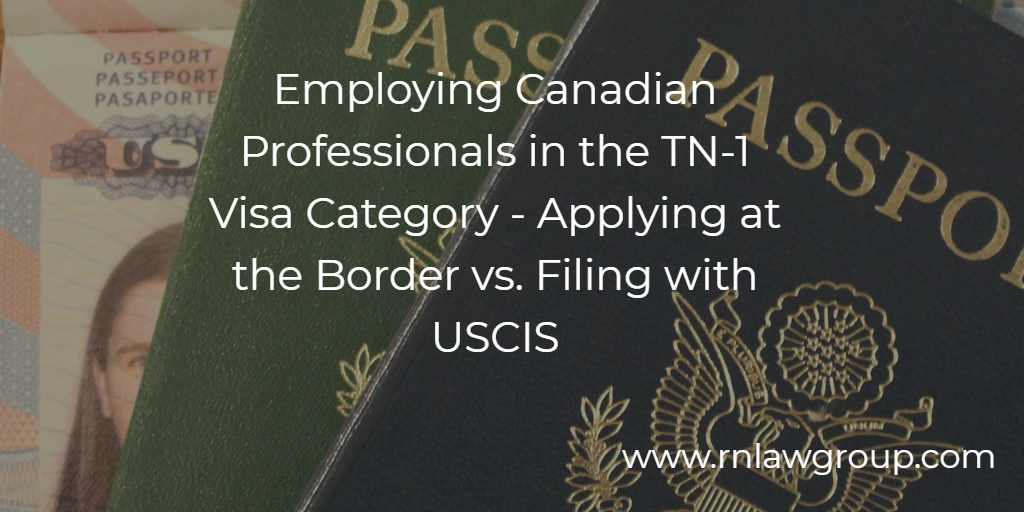
Employing Canadian Professionals in the TN-1 Visa Category – Applying at the Border vs. Filing with USCIS
The TN-1 visa is available to Canadian nationals who will be occupying a professional position (eligible professions and qualifications are listed here) for a U.S. company. Most TN-eligible professions require a bachelor’s degree in a related field, although some do not – candidates without degrees should have their qualifications assessed by the attorney to ensure they are eligible for the TN visa.
How to Apply
The application options for Canadian nationals depend on whether the prospective employee is currently in the U.S. or not:
If the applicant is currently in Canada
The TN application may be submitted directly at the U.S. port-of-entry by the prospective employee, who will submit an application package signed by the U.S. employer and undergo an interview with a U.S. Customs & Border Patrol officer concerning their qualifications and the proffered position. While the application can be submitted at any port-of-entry along the U.S.-Canada border, it is recommended to apply at one of the 14 ports that have been designated as optimized for TN processing (listed here). Furthermore, due to the ongoing closure of the border to non-essential travel during the COVID-19 pandemic, land border crossings have sometimes required evidence of the essential nature of the expected work in the U.S. in order to apply for entry. CBP preclearance stations at international airports have not been requiring this evidence, and therefore may be preferable during the border closure.
The applicant would learn the result of the application by the end of the interview with the CBP officer, and if successful, would be admitted into the U.S. the same day in TN-1 status. They are authorized to start work with the U.S. sponsoring employer immediately upon entry.
Government fees involved in this application method consist of the $50-56 visa processing fee charged at the border, which may be handled by the employee or the employer.
If the applicant is currently in the U.S.
For prospective employees currently in the U.S., the application can be made via the process listed above, if the applicant is willing or already planning to travel to Canada before starting with the new company. If the applicant will not be traveling internationally, the employer must file an I-129 petition by mail with U.S. Citizenship & Immigration Services, requesting a change in the employee’s status (if they are currently in a status other than TN), or a transfer of employer (if the applicant is already in TN status with a different company).
The prospective employee will be authorized to start work with the sponsoring company once the application has been approved by USCIS, which can take several weeks. It is therefore recommended to file the I-129 petition in premium processing, which requires USCIS to take action on the case within 15 days of filing.
Government fees involved in this process include the $460 USCIS filing fee for the I-129 petition, which must be paid by the U.S. employer. The optional premium processing fee is $2,500 and can be paid by the employer or employee.
Pros & cons of applying at the border and applying with USCIS
Prior to the COVID-19 pandemic, the most frequently-used method was direct application at the port-of-entry, as it does not require USCIS filing fees and provides a much faster result. Since 2020, the number of I-129 petitions filed with USCIS for TN applications has increased due to the uncertainty of international travel; however, as border and travel restrictions ease, more employers and applicants will likely opt for applying at the border due to the lower fees and speed of processing.
Absent travel obstacles or border restrictions, employers and applicants might still choose to file the I-129 petition rather than submit the application to CBP, even if the applicant is currently in Canada, if the success of the TN application is not certain. Because successful applications at the port-of-entry result in same-day admission to the U.S., the prospective employee must usually be prepared to relocate to the U.S. on the day they submit their application to CBP, including booking airline tickets and packing. If the application is unsuccessful for some reason, travel plans would need to be altered suddenly until the application could be adjusted and another attempt may be made.
For applications that involve some risk of denial (if applicant’s field of study is not obviously related to the offered position, for example), or for applicants who prefer more certainty before relocating, filing the I-129 petition may be preferable because USCIS would issue a Request for Evidence (RFE) seeking further information or documents if it has doubts concerning the approvability of the petition. The RFE provides the employer an opportunity to clarify or provide arguments for the case prior to the applicant’s travel (or while the applicant remains in the U.S. in their current status). Upon approval from USCIS, an I-797 Approval Notice would be issued that the applicant in Canada could provide to CBP at entry, providing more certainty to their travel plans.
Employers and prospective employees can contact Reddy & Neumann attorneys to discuss a potential TN application and to determine the best strategy and application method for their specific situation.
By: Rebecca Chen

